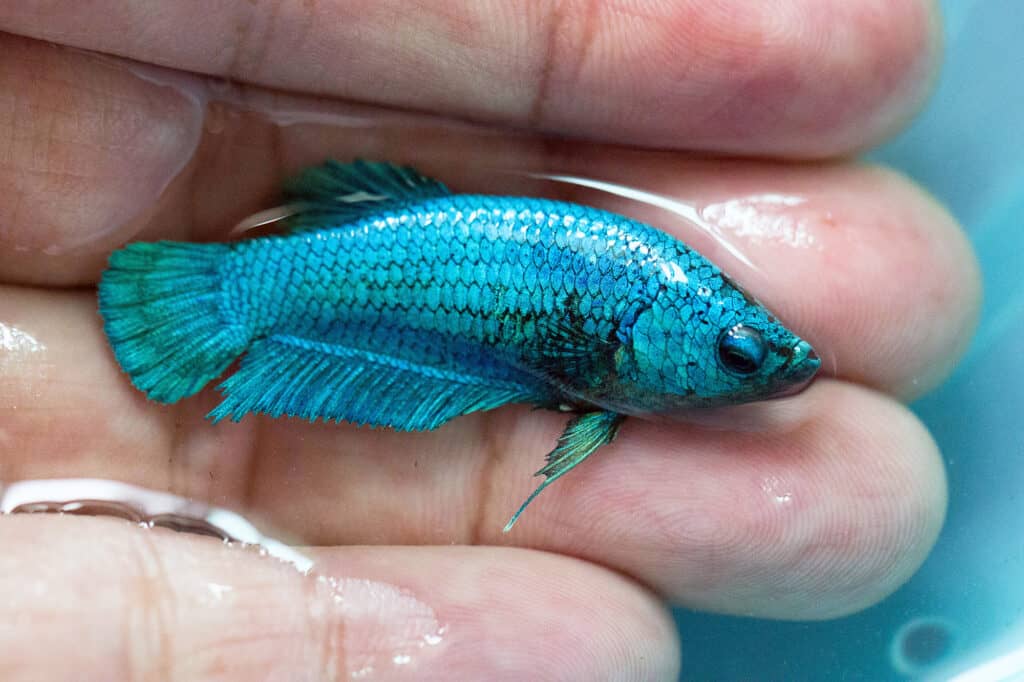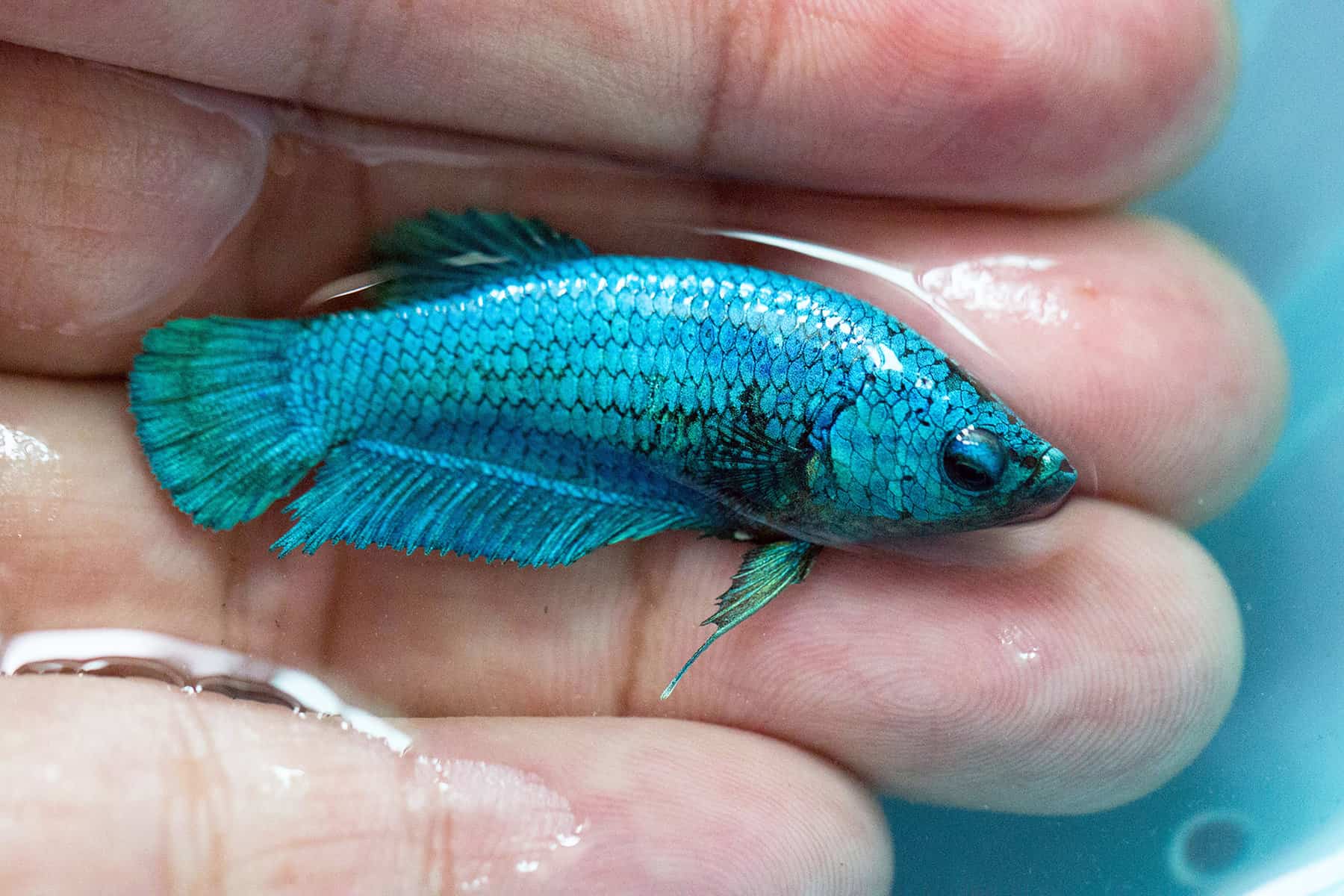Betta fish are well-known for their remarkable adaptation to breathe oxygen from the air as well as water. But how long could a betta fish live out of water altogether?
There have been no scientific experiments to determine how long a betta fish could survive out of water, but the estimated answer is between 30 minutes to at least 6 hours, depending on conditions.
This is a very long time for a fish to live out of water, so how does a betta do it, and what factors affect their survival? Let’s find out.
How Can a Betta Live For so Long Out of Water?
Betta fish are part of the anabantoids family, otherwise known as labyrinth fish. This small family of fish from Africa and Southeast Asia possesses the rare ability to breathe oxygen from the air as well as from water.
This means they can live for much longer periods of time in water with low-oxygen levels and even out of water than other fish species. It’s all because of the labyrinth organ.
What Is the Labyrinth Organ in Betta Fish?
The labyrinth organ is like an extension of the gills that allows betta fish (and other fish in their family) to breathe oxygen from the air.
When the fish gulps air from the surface, it is forced into the labyrinth organ where it is stored and gradually absorbed by the bloodstream.
The labyrinth organ got its name because within it are many maze-like compartments of lamellae – thin, bony membranes that absorb oxygen into the fish’s blood.
Factors Affecting How Long a Betta Can Live Out of Water
There are several factors that affect how long a betta could be expected to live for extended periods out of water:
Atmospheric Humidity
For a betta fish to survive out of water, it needs to remain moist.
If it begins to dry out, it will be unable to breathe properly and will quickly die from asphyxiation (lack of oxygen).
Ambient Temperature
Another factor affecting how long a betta fish can survive out of water is the ambient temperature. As you’ll know, betta fish are tropical fish that need an aquarium heater to survive in a fish tank.
Since a betta’s preferred temperature range is between 78 – 81°F, it could die from thermal shock if the air temperature is much cooler than this.
In general, thermal shock sets in when the temperature is shifted by more than 3°F over an hour period – so unless the air temperature is very similar to your tank’s water temperature, thermal shock is highly likely and can be fatal.
Condition of Your Fish
A substantial factor in how long a betta fish could survive out of water is the condition it was in before it found itself on dry land.
A healthy, well-resourced pet fish is much more likely to survive traumas such as being removed from the water than a fish that’s already in a weakened state before the event.
Type of Surface That It Fell On
In the wild, a betta fish may have to endure the shock of dry land if the pool that it’s living in dries up.
But in a fish tank, the most likely way your betta would end up out of water is if it jumped out of the tank.
The survival rate of a betta after such an incident depends a lot on which surface it fell on, and how far it fell.
If your betta fish jumped out of the tank and landed on a carpet, it will be a softer landing, but the fabric of the carpet will quickly suck moisture away from its body, causing it to dry out and die fairly quickly.
If your betta jumps onto a hard surface such as a wooden or tile floor, its chances of surviving the initial impact are less. If it didn’t fall too far, however, a betta laying on a hard floor may have longer to live than one that’s left on a carpet because it won’t dry out so rapidly.
Level of Shock/Trauma
Even if a betta fish survived for a period of time out of water and got returned to the fish tank, it may still later die from the shock of the accident.
Bettas are sensitive fish and suddenly finding themselves out of water will certainly be a shocking event for them. Shock and trauma can cause a betta fish to have a heart attack and die suddenly. Other times it may decline slowly over the next 48 hours or so.
At the very least, the event will weaken their immune systems, making them more vulnerable to infections that may already be present in the tank, so good aftercare is essential to help them make a full recovery.
Can a Betta Fish Really Jump Out of a Fish Tank?
Yes, betta fish really can and do jump out of fish tanks!
Jumping out of the water is particularly common in female betta fish as well as Plakat bettas which both have shorter fins than typical long-finned male Betta splendens.
Shorter fins allow bettas to swim more powerfully, so they’re more able to propel themselves out of the water.
But that doesn’t mean that long-finned males can’t jump out of the tank, too! It’s just less likely.
What To Do If Your Betta Fish Jumps Out of the Tank?
If your betta fish has jumped out of the tank, you need to act quickly. Even if your betta doesn’t appear to be breathing, pick it up very carefully and return it to the betta tank as quickly as you can.
Once your betta is submerged in water again, it may revive itself, even if it looked dead. If you see no gill movement after 20 minutes, however, you can be sure that your betta has died, and you need to make your sad farewell.
If your fish is still alive, keep a close eye on it over the next few hours to ensure that it’s recovering well and not developing any diseases or getting bullied by other fish.
If necessary, move it to a separate hospital tank to make necessary treatments.
How To Prevent Your Betta Fish From Jumping Out of the Aquarium
A betta fish jumping out of the tank is a risk to take seriously, so be sure to make necessary precautions to prevent it from happening.
The most important precaution is to fit the tank with a tight-fitting lid without any permanent openings that it could jump through.
After feeding or tank maintenance, make sure you close the lid or any openings in the hood immediately after.
Reasons That Your Betta Might Be Trying to Jump Out of Its Tank
If you do notice your betta attempting to jump out of the water, ask yourself if there’s any reason that it might be trying to do so.
If your water quality isn’t sufficient, or your tank is low in dissolved oxygen levels, your betta may be jumping in the hope of reaching better conditions elsewhere!
Test your aquarium water with a reliable test kit and keep on top of regular tank maintenance to ensure your betta remains healthy and happy where it is.
Bettas are also happiest in tanks with hiding places and are especially fond of live plants. Adding live plants can make a huge difference to your betta’s quality of life.
How Long Can Other Aquarium Fish Live Without Water?
Most small aquarium species of fish such as guppies and Neon tetra would only last around 10 minutes out of water.
Gouramis, Paradise fish, and other fish with the labyrinth organ would likely survive for similar amounts of time out of water as betta fish thanks to their ability to breathe atmospheric oxygen.
Which Fish Can Live for the Longest Time Out of Water?
According to Guinness World Records, four species of African Lungfish, Protopterus annectens, P. aethiopicus, P. dolloi, and P. amphibiusall can live for up to a staggering four years without water!
They do this by burrowing in the mud before a drought, making a mucus cocoon around their bodies, and using their specially adapted lungs to breathe air.
Conclusion
Betta fish can survive out of water much longer than most other fish thanks to their labyrinth organ. This is lucky, because betta fish are notorious for jumping out of aquariums, and this adaptation increases their chances of survival.
Although in most cases it’d be considerably less, a betta kept in the ideal conditions could probably live for around six hours out of water.
Despite their amazing ability to breathe air, bettas still need a good aquarium filter and a healthy oxygen supply to remain happy, healthy fish.

